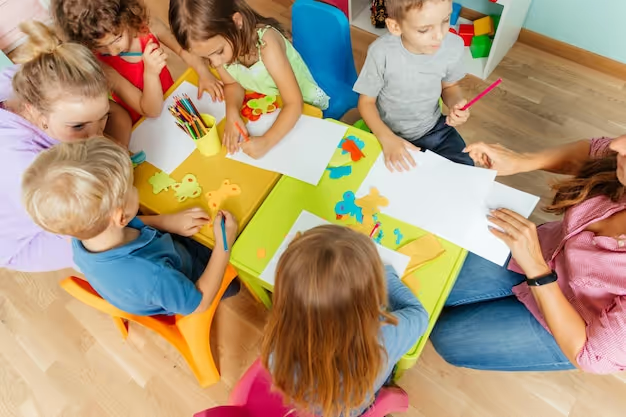
Fostering Social Skills in Daycare
In a daycare setting, fostering social skills is a fundamental aspect of a child's development. By providing opportunities for social interaction and play, caregivers can help children build essential social skills that will benefit them throughout their lives. This section will explore the importance of social development and the role of imaginative play in daycare.
Importance of Social Development
Social development plays a vital role in a child's overall growth and well-being. It involves learning how to interact with others, cooperate, communicate effectively, and develop empathy. Through positive social interactions, children develop important skills that contribute to their emotional, cognitive, and physical development.
Encouraging social development in daycare allows children to build relationships, develop a sense of belonging, and learn how to navigate social situations. According to early childhood educator Susan Bracken, providing plenty of time and guidance for imaginative play is essential for children to learn to be together, negotiate, problem-solve, and interact collaboratively [1]. Additionally, unstructured and uninterrupted playtime allows young children to learn through play and imitation, helping them develop social skills naturally [1].
Encouraging Imaginative Play
Imaginative play, also known as pretend play or make-believe play, is a powerful tool for fostering social development in daycare. During imaginative play, children create fictional scenarios, take on different roles, and engage in cooperative play with their peers. This type of play allows children to explore their creativity, develop problem-solving skills, and practice social interactions in a safe and supportive environment.
To encourage imaginative play in daycare, caregivers can provide a variety of props, toys, and materials that stimulate children's imagination. These could include dress-up clothes, dolls, action figures, building blocks, or open-ended materials like cardboard boxes and fabric scraps. By offering these resources, children can engage in imaginative play, create their own stories, and interact with their peers.
Caregivers should also facilitate and participate in imaginative play when appropriate. By joining in the play, caregivers can model positive social behaviors, encourage cooperation, and support children's language development. Caregivers can take on different roles, ask open-ended questions, and provide gentle guidance to enhance the learning experience.
By providing plenty of time and guidance for imaginative play, children can negotiate, problem-solve, and interact collaboratively, which are essential for social skill development. It's important to note that unstructured playtime is crucial for children to learn through play and imitation, helping them develop social skills naturally without adult intervention. By creating a supportive environment that promotes imaginative play, daycare centers can effectively foster social development in children.
In the next section, we will explore the importance of adult guidance and modeling in fostering social skills in daycare. Stay tuned for valuable insights on positive communication techniques and embracing individual differences.

Adult Guidance and Modeling
When it comes to fostering social development in daycare, adults play a crucial role in guiding and modeling positive social behaviors for children. By employing effective communication techniques and embracing individual differences, caregivers can create an inclusive and supportive environment for children to thrive.
Positive Communication Techniques
Effective communication is at the heart of building positive relationships with children. By employing positive communication techniques, adults can establish meaningful connections and foster social development. One important aspect is speaking to children from a place of respect and using positive language to encourage and motivate them.
Adults can model positive communication by:
- Identifying real-time emotions and helping children recognize and express their own emotions [1].
- Teaching children about turn-taking and the importance of listening to others.
- Verbalizing and praising prosocial behaviors they observe, such as sharing, taking turns, and showing empathy.
By engaging in authentic and empathetic communication, adults can create an environment where children feel valued, heard, and understood. For more information on encouraging language development in daycare, refer to our article on encouraging language development in daycare.
Embracing Individual Differences
In a daycare setting, it is essential to embrace and celebrate the individuality of each child. Every child is unique, with their own strengths, challenges, and interests. By embracing individual differences, caregivers can create an inclusive environment that promotes social development and fosters a sense of belonging.
To embrace individual differences, caregivers can:
- Adapt teaching strategies to meet the diverse needs of children.
- Encourage children to appreciate and respect one another's differences.
- Promote empathy and understanding by teaching children about diverse cultures, abilities, and backgrounds.
By creating a welcoming and inclusive environment, children can learn to appreciate diversity, develop empathy, and build meaningful relationships with their peers. For more information on promoting emotional development in daycare, refer to our article on encouraging emotional development in daycare.
As caregivers model positive communication techniques and embrace individual differences, they lay the foundation for healthy social development in children. By fostering a supportive and inclusive environment, daycare centers can nurture the social skills necessary for children to thrive in their interactions with others.

Building Positive Relationships
In daycare settings, building positive relationships is crucial for promoting social development in children. Caregivers play a significant role in fostering these relationships by establishing trust and effective communication.
Role of Caregivers in Social Development
Research consistently shows that children who have supportive relationships with their child care providers demonstrate better emotional regulation, higher self-esteem, and improved social skills. These relationships create a sense of safety and trust, enabling children to explore, learn, and develop to their fullest potential.
Caregivers in daycare settings play a vital role in social development by providing a nurturing and supportive environment. They serve as role models, guiding children's social interactions and teaching them important social skills. By creating a warm and welcoming atmosphere, caregivers lay the foundation for positive relationships with the children in their care.
Trust and Communication
Building trust is fundamental in any relationship, and it's especially critical when working in early education. Trust forms the foundation upon which positive relationships are built. To establish trust, caregivers need to create a safe and nurturing environment where children feel valued and respected. Consistency is key; caregivers should be reliable in their interactions and follow through on promises [2].
Effective communication is at the heart of building positive relationships with children. Through meaningful interactions, caregivers can connect with children on a deeper level. To have authentic communication with young children, it is important to speak to them from a place of respect. Positive language, open dialogue, and nonverbal communication are key components of empathetic communication. By actively listening and responding to children's needs and interests, caregivers can foster trust and build strong relationships [2].
Caregivers should also encourage children to express their thoughts and feelings, promoting open and honest communication. By creating a safe space for children to share their experiences, concerns, and joys, caregivers can establish a supportive environment where children feel heard and valued. This, in turn, strengthens the bond between caregivers and children, enhancing social development.
By recognizing the crucial role of caregivers in social development and prioritizing trust and effective communication, daycare settings can create an environment that fosters positive relationships and supports children's social growth. These positive relationships not only benefit children's social development but also contribute to their overall well-being and success in the daycare setting and beyond.
Inclusivity and Collaboration
Creating an inclusive and collaborative environment is crucial in encouraging social development in daycare. By embracing diversity and engaging with families and the community, daycare centers can foster a sense of belonging and provide a well-rounded educational experience for children.
Embracing Diversity
Every child is unique, with their own strengths, challenges, and interests. Embracing diversity enriches the learning experience and promotes inclusivity within the daycare setting. It is important to celebrate differences and create an environment where every child feels valued and respected. Adapt teaching strategies to meet the individual needs of each child, ensuring that they are fully included in all activities. By promoting empathy and understanding, children develop a sense of appreciation for diversity and learn to interact positively with others. For more information on promoting diversity and understanding in daycare, refer to our article on encouraging language development in daycare.
Engaging Families and Community
Building positive relationships extends beyond the classroom walls to include families, colleagues, and the community at large. Collaboration strengthens support networks and enhances the quality of care and education provided to children. By engaging families as partners in their child's learning journey, daycare centers can create a strong foundation for social development. Regular communication, parent-teacher conferences, and involvement in decision-making processes help establish a sense of trust and mutual understanding.
Connecting with colleagues and engaging in professional collaboration fosters a supportive environment within the daycare center. Sharing ideas, resources, and best practices allows educators to continuously improve their strategies for promoting social development. Furthermore, establishing connections with community organizations, such as libraries, museums, and local businesses, provides opportunities for enriching children's learning experiences and broadening their understanding of the world around them.
By actively embracing diversity and collaborating with families and the community, daycare centers can create a nurturing and inclusive environment that supports the social development of every child. Inclusivity and collaboration are essential pillars for fostering positive relationships and ensuring a comprehensive early childhood education. For more tips and strategies on building positive relationships with children, refer to our article on encouraging emotional development in daycare.
Playful Learning in Daycare
Playful learning is a valuable approach that fosters social development in daycare settings. By incorporating play into the daily routine, children not only have fun but also engage in meaningful experiences that support their overall development. Let's explore the benefits of playful learning and the role of guided play in enhancing learning.
Benefits of Playful Learning
Playful learning in early childhood settings has been proven to support children's development and learning across various domains and content areas. According to the National Association for the Education of Young Children (NAEYC), playful learning increases learning relative to more didactic methods. Here are some key benefits:
- Holistic Development: Playful learning promotes the development of social, emotional, cognitive, and physical skills simultaneously. Through play, children have the opportunity to enhance their communication, problem-solving, creativity, and motor skills.
- Engagement and Motivation: Playful activities capture children's interest and motivation, making the learning process more enjoyable and meaningful. When children are engaged in play, they are more likely to actively participate and retain information.
- Exploration and Discovery: Play provides an environment where children can explore, experiment, and make discoveries on their own. This hands-on approach allows them to develop a deeper understanding of concepts and build critical thinking skills.
- Imagination and Creativity: Playful learning encourages imagination and creativity. Children can express themselves, create narratives, and engage in pretend play, fostering their cognitive and social development.
Guided Play for Enhanced Learning
Guided play is an effective approach to playful learning that involves teachers focusing children's play around specific learning goals without taking over the activity. This approach, as highlighted by the NAEYC (NAEYC)), has been shown to result in increased learning for all children across various content areas.
During guided play, caregivers provide support, offer suggestions, and ask thought-provoking questions to extend children's thinking and learning. They create an environment that encourages exploration and problem-solving while ensuring that learning objectives are met.
By incorporating guided play into the daycare curriculum, teachers can facilitate social skills development, encourage collaboration, and promote deeper engagement with content areas. This approach allows children to take an active role in their learning while benefiting from the guidance and expertise of their caregivers.
Through playful learning and guided play, children in daycare settings can develop socially, emotionally, cognitively, and physically. By creating an environment that embraces playful learning, caregivers can support children's holistic development and lay a strong foundation for future learning.
To learn more about other aspects of development in daycare, check out our articles on encouraging language development, encouraging emotional development, encouraging cognitive development, and encouraging physical development.
Dramatic Play for Social Development
In the context of daycare, dramatic play plays a vital role in the social development of children. It provides them with safe environments to practice emotional, physical, verbal, and social skills, allowing for holistic growth and development.
Role of Dramatic Play
Dramatic play serves as a powerful tool for children's emotional development. It provides them with a platform to process, understand, and express their emotions in different ways. Engaging in dramatic play helps children learn to negotiate, cooperate, and navigate group dynamics, fostering empathy and understanding. By assuming different roles and engaging in imaginative scenarios, children can explore and experiment with various emotions, enhancing their emotional intelligence.
Furthermore, dramatic play serves as an outlet for children to express and process emotions, handle stress and anxiety, and take control of narratives and outcomes in a safe space. This type of play allows children to explore their preferences, strengths, and possibilities, contributing to their overall emotional well-being [3].
Enhancing Social Skills
Alongside emotional development, dramatic play nurtures social skills in children. By providing opportunities for interaction, communication, collaboration, role negotiation, conflict resolution, and understanding different perspectives, dramatic play enhances empathy, cooperation, and the ability to form positive relationships. It encourages children to work together, share ideas, and engage in imaginative problem-solving.
Through dramatic play, children learn how to take turns, listen to others, and engage in reciprocal conversations. They develop and refine their social skills by observing and imitating the behavior of their peers. This type of play fosters a sense of belonging, builds self-confidence, and creates a supportive and inclusive environment for social interaction.
In addition to emotional and social development, dramatic play also contributes to the physical coordination of children. By engaging in activities that develop fine and gross motor skills, balance, and spatial awareness, children enhance their overall physical coordination. This holistic approach to development through dramatic play emphasizes the interconnectedness of various developmental domains.
In conclusion, incorporating dramatic play into daycare settings has numerous benefits for children's social development. By providing opportunities for emotional expression, role-playing, and collaborative problem-solving, dramatic play nurtures empathy, cooperation, and positive relationships. It also contributes to physical coordination, making it an essential component of a well-rounded daycare experience. For more information on encouraging development in other areas, check out our articles on encouraging language development in daycare, encouraging emotional development in daycare, encouraging cognitive development in daycare, and encouraging physical development in daycare.
